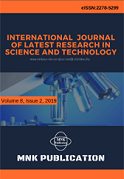DOI:10.29111/ijlrst ISRA Impact Factor:3.35
Research Paper Open Access
International Journal of Latest Research in Science and Technology Vol.3 Issue 4, pp 40-46,Year 2014
Correspondence should be addressed to :
Received : 06 August 2014; Accepted : 19 August 2014 ; Published : 31 August 2014

| Download | 126 |
|---|---|
| View | 180 |
| Article No. | 10352 |
The study explored the influence of gender on student delinquent behaviours and academic achievement. Expose facto design was used in carrying out the study. Three purposes, three research questions and three hypotheses guided the study. Validated questionnaire was used for the collection of data. In analyzing the data, mean and t-test were used for answering the research questions and testing hypotheses respectively. The results indicated that gender has no significant influence on delinquent behaviours. Gender significantly influences academic achievement of secondary school students. Location has no significant influence on students based on their academic achievement and gender.
Copyright © 2014 Igbo et al. This is an open access article distributed under the Creative Commons Attribution 4.0 International (CC BY 4.0) license which permits unrestricted use, distribution, and reproduction in any medium, provided the original work is properly cited.
Igbo, J. N. (Ph.D) ,Ihejiene,Mary Anselm (Rev. Sr.) , " Gender Differences, Delinquent Behaviours And Academic Achievement Of Secondary School Students In Nigeria ", International Journal of Latest Research in Science and Technology . Vol. 3, Issue 4, pp 40-46 , 2014

MNK Publication was founded in 2012 to upholder revolutionary ideas that would advance the research and practice of business and management. Today, we comply with to advance fresh thinking in latest scientific fields where we think we can make a real difference and growth now also including medical and social care, education,management and engineering.

We offers several opportunities for partnership and tie-up with individual, corporate and organizational level. We are working on the open access platform. Editors, authors, readers, librarians and conference organizer can work together. We are giving open opportunities to all. Our team is always willing to work and collaborate to promote open access publication.

Our Journals provide one of the strongest International open access platform for research communities. Our conference proceeding services provide conference organizers a privileged platform for publishing extended conference papers as journal publications. It is deliberated to disseminate scientific research and to establish long term International collaborations and partnerships with academic communities and conference organizers.